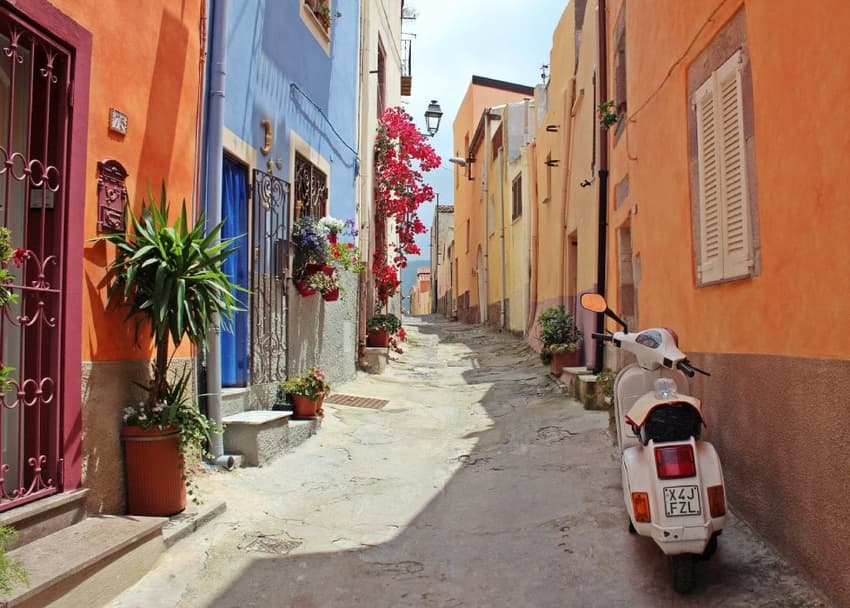13 ways to make your life in Italy easier without really trying

Living in Italy can be challenging, with bureaucracy, local dialects and new customs to get used to. But you can make life easier without too much effort.
Italy is a great place to live, with (mostly) warm weather, breathtaking landscapes, and a relaxed lifestyle.
But everyday life might be challenging at first, especially for those coming from totally different cultures and ways of life.
To help make things easier, here are some tips that The Local's readers (and writers) swear by.
Always carry cash
Though things have changed quite a bit over the past few years and more shops are now accepting card payments, cash is still very much king in Italy.
All Italian businesses are legally required to accept card payments, but many merchants across the boot are not very fond of those rules – mostly because each card transaction comes with an average 0.7 percent processing fee – and would rather risk getting a fine than have their clients pay by card.
READ ALSO: Are Italian taxi drivers required to accept card payments?
So, it’s not uncommon at all to come across places that only accept cash or produce barely believable excuses (“our card machine is out of order”). As such, you should always have some notes on you.
Buy ear plugs
Sleep, and especially good sleep, plays a vital role in good health and well-being, but there are plenty of things that will get in the way of it in Italy, particularly if you live in a city or an apartment block.
Whether it’s a pesky neighbour using the aspirapolvere (vacuum) at the most unreasonable time of the day or construction workers running wild early-morning experiments on human noise tolerance, a good pair of ear plugs will come in vital for blocking all sorts of unwanted noise.
Get professonal help with bureaucracy
Paperwork in Italy is a bit like the Fast & Furious movie franchise: whenever you think you've seen the last of it, there’s always more.
In fact the endless red tape is so frustrating and time-consuming that many Italians, when possible, hire a professional to help.
Accountants and lawyers are not cheap, but can save you a lot of time, if not money in the long run, and their help will greatly improve your chances of success.

Seeking professional help is the best way to navigate Italian bureaucracy. Photo by Scott GRAHAM via Unsplash
Mind your emails
Those who have the fortune (or misfortune, you decide) to work with Italian colleagues or for Italian clients, may already know this: Italian emails read more like a 19th-century epistolary novel than actual emails.
From obsolete greetings and sign-off lines to various personal titles and odd abbreviations, Italian emails are generally quite stiff and formal.
If you have to write such emails yourself, this may feel unnatural. But take your colleagues' lead on this and strive to abide by the Italian style rules so as to avoid coming off as dismissive or impolite.
Here's more on how to write a formal email in Italian.
Learn at least the basics of Italian (and some dialect)
This one does require a bit of effort, but it's essential. Most Italians really do have a poor command of English, which makes learning Italian an absolute must.
Not having any Italian language skills will make your daily interactions much more stressful than they need to be and will seriously handicap your social life. As such, you should try to achieve basic proficiency at the very least.
READ ALSO: Five tips that make it easier to learn Italian
It might also be useful to pick up some words or expressions from your local dialect as you go along as residents love to use it when communicating with each other.
Embrace Italian habits
From the cappuccino+cornetto (cappuccino and croissant) combo for breakfast to the restorative post-lunch pennichella (nap), you might want to adopt at least some of Italy’s particular traditions.
Aside from the likely health and well-being benefits, doing so will also make you feel more in tune with your new home.
READ ALSO: 17 ways your eating and drinking habits change when you live in Italy

Expect coffee to be the cornerstone of your life in Italy. Photo by Jess EDDY via Unsplash
Forget about being punctual
Italians are chronically late and that’s not going to change (at least, not anytime soon).
So you can pretty much forget all you know about being punctual and adapt to the collective lateness.
For instance, if you and a local friend of yours plan to meet at 2.30pm, you’ll want to turn up at about 2.45 or even 2.50 to avoid twiddling your thumbs for a good quarter of an hour.
It’s worth noting however that you shouldn’t apply the above rule to your work meetings nor to other official appointments.
Here's more about exactly how late it's normal to be in Italy.
Get nerdy with mobile apps
However surprising you might find it, Italy seems to have finally caught up with the digital revolution as the popularity of mobile apps keeps growing by the day.
As a resident, you should be taking advantage of some of these new online services to make your life a tad easier.
READ ALSO: Six essential apps that make life in Rome easier for foreign residents
Useful apps include: Moovit (for public transport), Enjoy (car-sharing), RideMovi (bike-sharing), Glovo (food delivery) and Free Now (to order a taxi).
Get a supermarket loyalty card (or more than one)
Groceries and everyday goods can be quite expensive in Italy, especially in major northern cities.
And while going to the best-value supermarket in your area might allow you to save as much as 2,000 euros a year, there’s another money-saving hack that many shoppers tend to ignore: getting a supermarket loyalty card.
READ ALSO: From coffee to haircuts: How the cost of living varies around Italy
Loyalty cards will give you access to generous in-store deals and discounts on store-brand items. By accumulating loyalty points, you’ll also earn yourself the right to claim a free gift, which could be anything from tableware to home furniture.
Take advantage of the saldi
If you love a bargain, you might want to make a note of your local area's saldi (sales) dates.
There are two rounds of sales every year – one in the summer and one in the winter – but the start and end times vary from region to region.
READ ALSO: When do the January 2023 sales start in Italy
Discounts are usually around 20 or 30 percent but they can climb as high as 70 percent. Shops are required to display the original prices next to the discounted ones, so you’ll know exactly how much of a bargain you’re getting.

'Saldi' season is the best time of the year to go shopping in Italy. Photo by Andreas SOLARO / AFP
Learn about Italy’s tax bonuses
Each year, the Italian government offers a number of tax deductions to encourage residents to engage in economy-boosting, energy-saving or otherwise worthwhile projects.
In fully Italian fashion though, the paperwork involved is usually a black hole of bureaucratic despair.
READ ALSO: From renovations to cinema tickets: The Italian tax ‘bonuses’ you could claim in 2023
That said, with the appropriate professional help (see above), you really might be able to save you and your family tens of thousands of euros.
Sign up to streaming services
From dull game shows to sleep-inducing talk shows, Italian TV is for the most part utterly atrocious – something which most locals will happily admit.
In Italy, you’re better off turning to streaming platforms or resorting to alternative sources of entertainment.
Up your cleaning game
As you may already have noticed, Italians in general have very high cleaning standards and tend to look unfavourably on people who don’t keep their homes spotless at all times. Yes, you can expect to be judged - and harshly.
If you don’t keep on top of the housework, there will come a time when an Italian friend or relative pays a visit to your place, and that visit will have to be preceded by hours of deep cleaning. And nobody wants to do that.
Do you have any more tips on making life in Italy slightly easier? We'd love to hear them in the comments section below.
Comments
See Also
Italy is a great place to live, with (mostly) warm weather, breathtaking landscapes, and a relaxed lifestyle.
But everyday life might be challenging at first, especially for those coming from totally different cultures and ways of life.
To help make things easier, here are some tips that The Local's readers (and writers) swear by.
Always carry cash
Though things have changed quite a bit over the past few years and more shops are now accepting card payments, cash is still very much king in Italy.
All Italian businesses are legally required to accept card payments, but many merchants across the boot are not very fond of those rules – mostly because each card transaction comes with an average 0.7 percent processing fee – and would rather risk getting a fine than have their clients pay by card.
READ ALSO: Are Italian taxi drivers required to accept card payments?
So, it’s not uncommon at all to come across places that only accept cash or produce barely believable excuses (“our card machine is out of order”). As such, you should always have some notes on you.
Buy ear plugs
Sleep, and especially good sleep, plays a vital role in good health and well-being, but there are plenty of things that will get in the way of it in Italy, particularly if you live in a city or an apartment block.
Whether it’s a pesky neighbour using the aspirapolvere (vacuum) at the most unreasonable time of the day or construction workers running wild early-morning experiments on human noise tolerance, a good pair of ear plugs will come in vital for blocking all sorts of unwanted noise.
Get professonal help with bureaucracy
Paperwork in Italy is a bit like the Fast & Furious movie franchise: whenever you think you've seen the last of it, there’s always more.
In fact the endless red tape is so frustrating and time-consuming that many Italians, when possible, hire a professional to help.
Accountants and lawyers are not cheap, but can save you a lot of time, if not money in the long run, and their help will greatly improve your chances of success.

Mind your emails
Those who have the fortune (or misfortune, you decide) to work with Italian colleagues or for Italian clients, may already know this: Italian emails read more like a 19th-century epistolary novel than actual emails.
From obsolete greetings and sign-off lines to various personal titles and odd abbreviations, Italian emails are generally quite stiff and formal.
If you have to write such emails yourself, this may feel unnatural. But take your colleagues' lead on this and strive to abide by the Italian style rules so as to avoid coming off as dismissive or impolite.
Here's more on how to write a formal email in Italian.
Learn at least the basics of Italian (and some dialect)
This one does require a bit of effort, but it's essential. Most Italians really do have a poor command of English, which makes learning Italian an absolute must.
Not having any Italian language skills will make your daily interactions much more stressful than they need to be and will seriously handicap your social life. As such, you should try to achieve basic proficiency at the very least.
READ ALSO: Five tips that make it easier to learn Italian
It might also be useful to pick up some words or expressions from your local dialect as you go along as residents love to use it when communicating with each other.
Embrace Italian habits
From the cappuccino+cornetto (cappuccino and croissant) combo for breakfast to the restorative post-lunch pennichella (nap), you might want to adopt at least some of Italy’s particular traditions.
Aside from the likely health and well-being benefits, doing so will also make you feel more in tune with your new home.
READ ALSO: 17 ways your eating and drinking habits change when you live in Italy

Forget about being punctual
Italians are chronically late and that’s not going to change (at least, not anytime soon).
So you can pretty much forget all you know about being punctual and adapt to the collective lateness.
For instance, if you and a local friend of yours plan to meet at 2.30pm, you’ll want to turn up at about 2.45 or even 2.50 to avoid twiddling your thumbs for a good quarter of an hour.
It’s worth noting however that you shouldn’t apply the above rule to your work meetings nor to other official appointments.
Here's more about exactly how late it's normal to be in Italy.
Get nerdy with mobile apps
However surprising you might find it, Italy seems to have finally caught up with the digital revolution as the popularity of mobile apps keeps growing by the day.
As a resident, you should be taking advantage of some of these new online services to make your life a tad easier.
READ ALSO: Six essential apps that make life in Rome easier for foreign residents
Useful apps include: Moovit (for public transport), Enjoy (car-sharing), RideMovi (bike-sharing), Glovo (food delivery) and Free Now (to order a taxi).
Get a supermarket loyalty card (or more than one)
Groceries and everyday goods can be quite expensive in Italy, especially in major northern cities.
And while going to the best-value supermarket in your area might allow you to save as much as 2,000 euros a year, there’s another money-saving hack that many shoppers tend to ignore: getting a supermarket loyalty card.
READ ALSO: From coffee to haircuts: How the cost of living varies around Italy
Loyalty cards will give you access to generous in-store deals and discounts on store-brand items. By accumulating loyalty points, you’ll also earn yourself the right to claim a free gift, which could be anything from tableware to home furniture.
Take advantage of the saldi
If you love a bargain, you might want to make a note of your local area's saldi (sales) dates.
There are two rounds of sales every year – one in the summer and one in the winter – but the start and end times vary from region to region.
READ ALSO: When do the January 2023 sales start in Italy
Discounts are usually around 20 or 30 percent but they can climb as high as 70 percent. Shops are required to display the original prices next to the discounted ones, so you’ll know exactly how much of a bargain you’re getting.

Learn about Italy’s tax bonuses
Each year, the Italian government offers a number of tax deductions to encourage residents to engage in economy-boosting, energy-saving or otherwise worthwhile projects.
In fully Italian fashion though, the paperwork involved is usually a black hole of bureaucratic despair.
READ ALSO: From renovations to cinema tickets: The Italian tax ‘bonuses’ you could claim in 2023
That said, with the appropriate professional help (see above), you really might be able to save you and your family tens of thousands of euros.
Sign up to streaming services
From dull game shows to sleep-inducing talk shows, Italian TV is for the most part utterly atrocious – something which most locals will happily admit.
In Italy, you’re better off turning to streaming platforms or resorting to alternative sources of entertainment.
Up your cleaning game
As you may already have noticed, Italians in general have very high cleaning standards and tend to look unfavourably on people who don’t keep their homes spotless at all times. Yes, you can expect to be judged - and harshly.
If you don’t keep on top of the housework, there will come a time when an Italian friend or relative pays a visit to your place, and that visit will have to be preceded by hours of deep cleaning. And nobody wants to do that.
Do you have any more tips on making life in Italy slightly easier? We'd love to hear them in the comments section below.
Join the conversation in our comments section below. Share your own views and experience and if you have a question or suggestion for our journalists then email us at [email protected].
Please keep comments civil, constructive and on topic – and make sure to read our terms of use before getting involved.
Please log in here to leave a comment.